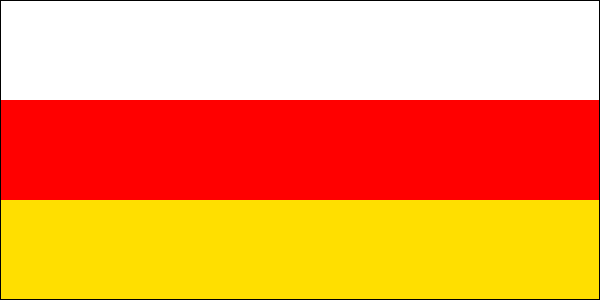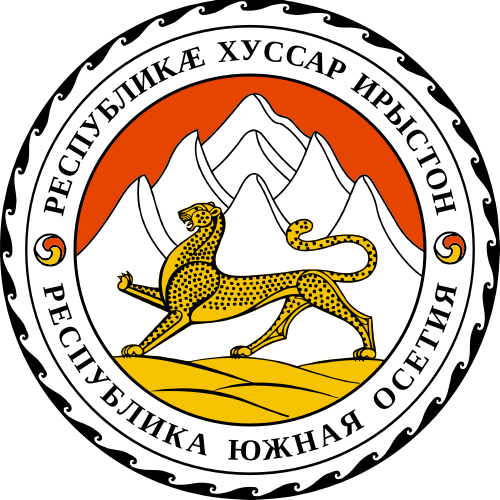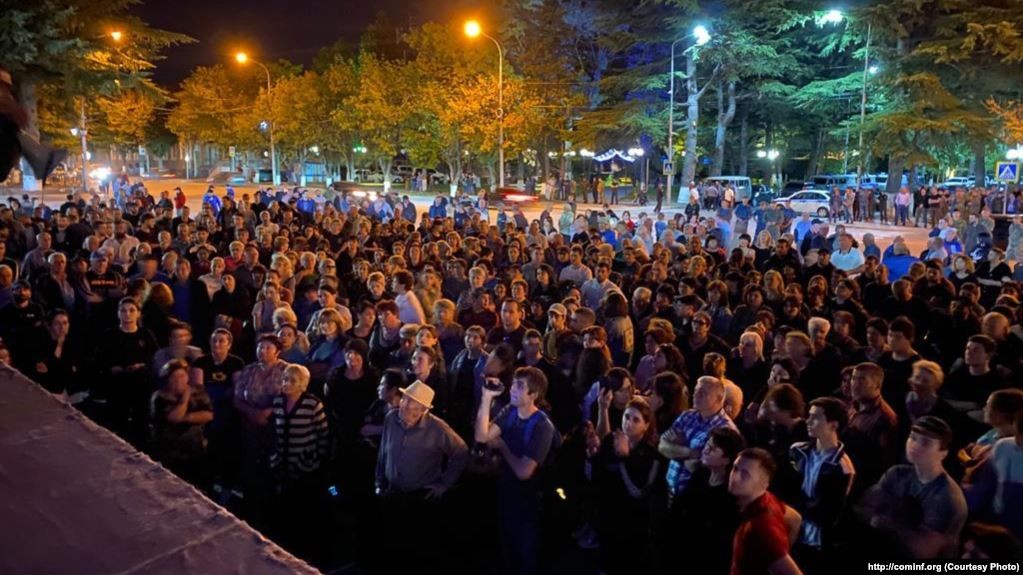Protest Wave Engulfs South Ossetia
-
3 September 2020
-
Author Thijs Korsten
“Resign! Resign! Resign!” These were the words heard on the evening of Friday 28 August on the main square of Tskhinvali, the capital of de facto state South Ossetia. The words were addressed to its President Anatoly Bibilov, whose position seems more insecure than ever before. What happened to imperil the regime so severely?
On 28 August it transpired that Inal Dhzabiev, a 30-year-old father of three, had died in custody. He had been detained as a suspect for the attempt on the life of Interior Minister Igor Naniev, during a shooting incident which occurred on 17 August. Soon after Dzhabiev’s relatives were informed that he had died, images of his body spread across social networks, leaving little doubt that he had been tortured. It later became clear that other detainees in this case had been brutally beaten, too. By the end of the evening, a wave of frustration had brought 1,500 to 2,000 South Ossetians to the central square. Prime Minister Eric Pukhaev and his government resigned, and under pressure, President Bibilov suggested he would allow a plebiscite on his continued leadership.
Yet, the protestors’ demands have not been met yet. They want not only a fair and thorough investigation into the case of Dzhabiev’s death, but also the dismissal of the Attorney General and the Interior Minister. Many also demand that Bibilov steps down immediately. A criminal investigation has begun, but the expectation is that a few scapegoats will be picked while structural lawlessness remains. It also seems that the investigation has been started false premises. Dzhabiev’s cousin Alina, currently in Beslan, North Ossetia: “If we accept this [death] certificate, we agree that he died of a blood clot. He didn’t die of a blood clot.”
Dzhabiev’s funeral was on the last day of August, and the gathering quickly grew into both a public mourning and a mass protest. Again, up to 2,000 people–a significant number for a total population of only some 25-35,000–gathered on the square. Bibilov was also there, with his security guards, but “few people paid attention to him,” reports Ekho Kavkaza. To avoid escalation, the protestors were barred from marching to the building of the presidential administration. The protests remain leaderless, I was told by civil activist Tamara Mearakishvili. But the weak South Ossetian political opposition has begun to react. Prominent opposition MP David Sanakoev of the Nykhas party voiced five demands, including Bibilov’s resignation and structural reform of the Ministry of Internal Affairs and the prosecutor’s office under public scrutiny, as opposed to merely resigning and rotating ministers.
Former President Eduard Kokoity (2001–11) also decided to get involved, urging Bibilov to resign in a video message and threatening he would come to South Ossetia from the North to join the demonstrations. He also warned against blood feuds, emphatically urging South Ossetians that the crisis should be dealt with following the laws and constitution of the de facto statelet. Kokoity’s moves have not remained uncriticised, however. Some fear that he and his circles want to take advantage of the political crisis, and wonder why he “has not been with the South Ossetians” all this time (but has been living in Moscow instead). For now, Kokoity’s entry is blocked by the border with Russia (which has been closed for months due to the coronavirus pandemic). During the funeral gathering on Monday, prominent public figure Timur Tskhurbati was badly beaten in a fight and taken to hospital with a fractured cheekbone and nose, allegedly in retaliation for his critical comments on Kokoity.
Behind the current turmoil simmers a deeper crisis in de facto South Ossetia. State-perpetrated violence and lawlessness is the first, persistent component of this crisis. Dzhabiev’s death followed a series of violent incidents in the edifices of the de facto state, whose perpetrators were not prosecuted. In early June this year, a number of inmates engaged in self-harm to protest against prison beatings. Connections are also being drawn to the death of Vladimir Tskayev in North Ossetia, who died in November 2015 while held in pre-trial detention. Commenting on Dzhabiev’s death, Tskayev’s widow said the images of his body circulating on the Internet reminded her shockingly of her husband’s death, as though police brutality operates according to the same principles and techniques in both South and North Ossetia.
The second component adding to the frustration is that South Ossetians do not feel heard in the system of patrimonial authoritarianism which governs the territory. Experts already warned of Bibilov’s control over all branches of power in 2017, when he rose to the presidency. Earlier this year, when a scandal about prison beatings surfaced, Bibilov protected his justice and interior ministers when opposition MPs demanded their resignation. Now, popular pressure on his personally consolidated rule is mounting. The lack of trust in institutions means that this pressure is directed at the singular man at the top of the patrimonial pyramid, Bibilov himself. There are few, if not none, alternative channels for mass discontent. At the same time, the official opposition remains weak. Exemplary of the de facto government’s dismissal of both opposition and demonstrators were Foreign Minister Dmitry Medoev’s remarks, who aimed to undermine the protest wave with a conspiratorial geopolitical narrative. “Instead of demanding that the president strictly follow the letter of the law and punish all the guilty according to the law,” Medoev stated, “the ‘opposition’ demands a change of the legally elected government and is ready to personally organize and participate in the ‘Maidan’”.
The coronavirus pandemic is the third and final element in the mix. Whereas previously South Ossetians were grateful that the coronavirus was by and large prevented from sweeping across the fragile polity, now they increasingly face unbearable socioeconomic struggles. Elderly cannot travel to Russia to collect their pensions, there are medicine shortages, and food prices have risen. Clearly, Belarus is not the only place in the post-Soviet space where the coronavirus crisis has served as a “last drop” for overflowing of societal discontent. There have as of yet been no signs of Russia’s envoys travelling to the breakaway territory. Perhaps, as conflict analyst Olesya Vartanyan suggested, they have their hands full with Lukashenko?
Thijs Korsten has worked as an intern for the Georgian Foundation for Strategic and International Studies (GFSIS), researching the Georgian-Ossetian conflict, and is an incoming graduate student at the Department of International Relations at the Central European University in Vienna. His research interest is in the political sociology of power, territory, inequality, and violence.


